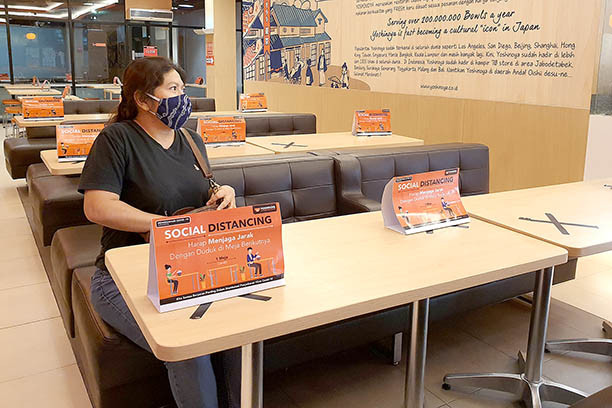Businesses feel pain of new COVID-19 policy
As industry associations call for the government to ease restrictions a week into the latest PPKM policy, two economists underline that reducing daily virus cases is key to restoring consumption.
Change Size

I
ndustry associations have called in desperation for the easing of the latest COVID-19 restrictions and more government support to help companies survive the pandemic, even as Indonesia watches the number of new cases go off the scale following the 2020 year-end holiday season.
The call comes following the imposition of the public activity restrictions (PPKM) on Jan. 11 for two weeks in Java and Bali, which falls during what the associations claimed was a “crucial sales period”.
Representing several industries that recorded gains from the rise of the middle class prior to the public health emergency, the Indonesian Employers Association (Apindo), the Indonesian Shopping Center Association (APPBI), the Indonesian Hotel and Restaurant Association (PHRI) and the Indonesian Commercial Tenants Association (Hippindo) issued a joint statement on Monday that detailed their pleas for easing restrictions and additional business relief assistance for retailers, restaurants, shopping malls and hotels.
Specific demands include allowing restaurants and retail stores to operate until 9 p.m. at 50 percent dine-in capacity.
“The social restrictions have kept Indonesian businesses from being able to make even the most basic decisions on matters like cash flow and employees,” Apindo chairman Hariyadi Sukamdani said during a press briefing on Monday.
Hariyadi said the PPKM was a crushing blow to shopping malls, hotels, restaurants and retail outlets that were already suffering from last year’s “pandemic pain”.
The government’s latest restrictive policy to combat the persisting rise in virus cases is in effect from Jan. 11 to 25, which falls within a typical low season in travel and leisure.
Among other restrictions, the PPKM requires 75 percent of employees to work from home, while it requires retail stores and restaurants to operate at 25 percent capacity and close at 7 p.m. The requirements are relatively looser than the original large-scale social restrictions (PSBB) imposed in March and June, which prohibited dine-in services and closed all malls as well as entertainment and leisure venues.
Indonesia has broken its daily COVID-19 record in recent days with more than 14,200 new cases recorded on Jan. 16, two weeks after the year-end holiday.
At the time of publishing, official data showed a nationwide total of 917,015 cases in all 34 provinces and almost 26,300 deaths, the highest in Southeast Asia.
“Modern shopping centers have [been targeted] while other [commercial] businesses are allowed to operate close to normal,” Ellen Hidayat, who chairs the APPBI’s Jakarta branch, told the briefing on Monday.
“We have stringently implemented the health protocols and will continue to do so, but businesses operating outside of shopping centers simply lack government supervision,” she said.
The associations have also asked for direct financial assistance to pay employees’ salaries, as well as tax relief and business relief grants in the event that the PPKM was prolonged. It has also called on the government to help companies in obtaining working capital loans, as banks remained in risk-averse mode.
“If companies’ cash flows continue to suffer significantly, we will have no other option but to lay off or furlough employees again,” said Apindo’s Hariyadi. “We expect that, if the [PPKM] continues, 30 percent of all formal workers will lose their jobs during the pandemic.”
The government allocated Rp 177 trillion (US$12.61 billion) last year in COVID-19 relief funds for private companies, state-owned enterprises and micro, small and medium enterprises (MSMEs). It has allocated an additional Rp 63.84 trillion this year.
“The current measure [PPKM] is right for fighting the pandemic and helping the economy. We can’t afford a full lockdown now, as the economy and fiscal position have already suffered a huge blow,” University of Indonesia economist Ari Kuncoro told The Jakarta Post on Monday.
“The upper-middle class will start spending their money again and will be better in a position to support the economy if the government can suppress virus cases,” he said, stressing that the restrictive measure was necessary to help curb virus transmission.
Continuing, he pointed out that the government’s relief package would be more effective if the nationwide outbreak was brought under control, but added that financial authorities should help with loan access so businesses could jump-start economic activities.
“The upper-middle class will continue to refrain from consumption as long as daily virus cases remain high and social restrictions continue,” Bank Mandiri economist Faisal Rachman said separately.
“Recovery of household consumption will depend on the government’s ability to overcome the pandemic. Recovery will be faster if [the number of] virus cases fall.”









